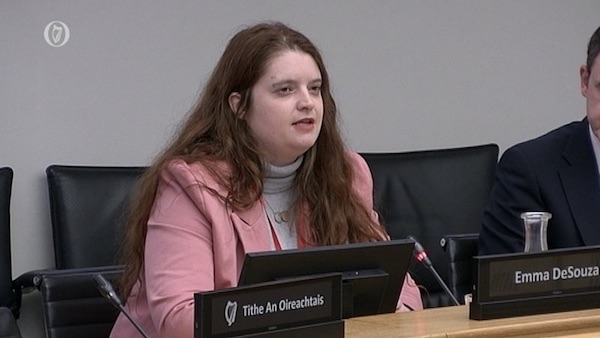
A Derry woman who is challenging restrictions on her right to legally identify as Irish has called for Dublin to support efforts to uphold the rights of nationalists under the Good Friday Agreement.
Emma DeSouza is challenging her automatic categorisation as a British citizen under British law rather than having a choice of Irish citizenship as provided for in the Good Friday Agreement.
She said there remains a responsibility on the Irish government as a co-guarantor to uphold and protect the agreement. She told a parliamentary committee of the Dáil that it is clear that an amendment to the British Nationality Act 1981 is necessary.
“If the British government can arbitrarily disregard rights guaranteed to the people of Northern Ireland under an internationally binding peace treaty, what safeguards are in place to prevent further diminution of rights?” Ms DeSouza asked in her opening remarks to the committee.
On 14 October the Upper Tribunal of the British judicial system ruled that Irish people born in the north of Ireland remain British citizens even if they identify as Irish.
British courts have repeatedly backed the British Home Office’s arguments that those born in the Six Counties under British jurisdiction have no right to choose their nationality, regardless of the birthright provisions outlined in the Good Friday Agreement.
Rather, they are permitted to identify on a personal level as Irish, but under British rule they are considered British from birth.
“This sets a dangerous precedent, reducing an integral right to choose one’s own national identity in this case, to identify as and be accepted as Irish into a right to merely “feel” Irish,” Ms DeSouza told the committee.
Ms DeSouza told the hearing that she does not believe that the October ruling is compatible with the Good Friday Agreement.
“Through this process I’ve had to outline every moment in my life that my Irish identity has been evident in order to prove that I am Irish.
“I’ve had to face the repeated exertions from the Home Office that I am in fact British and that until such time as I accept that I am British, I cannot be accepted as exclusively Irish,” Ms DeSouza said.
She added: “It has been encouraging to many that the Irish Government has become more vocal on this issue and I’m sure many will take solace from this committee hearing today.
“However, the denial of rights continues and has a real-time effect on people across Northern Ireland. Last week I met with another family renouncing British citizenship, the week previous another leaving the country to access their rights. An urgent and effective response is required.”
Law professor Colin Harvey also told the committee that pressure needs to be put on the British government, “they haven’t recognised the constitutional importance of the Good Friday Agreement and that needs to the change.”
“It is time for the British government to accept that there is an implementation failure that must be remedied.
“Its unwillingness to do so raises legitimate questions about its commitment to the Agreement, and whether it respects the human rights and human dignity of those affected,” Mr Harvey said.
Sinn Féin’s Gerry Adams also told the committee today that he was always uncomfortable when negotiating rights issues during the Good Friday Agreement discussions.
“I always thought the best option was to take in best international practice,” Mr Adams said.
He said the onus is on the Dublin government to act on Ms DeSouza’s case, which is expected to be heard in the Court of Appeal in Belfast. Ms DeSouza has said they hope to get a hearing date at the Court of Appeal next year.
![[Irish Republican News]](https://republican-news.org/graphics/title_gifs/rn.gif)
![[Irish Republican News]](https://republican-news.org/graphics/title_gifs/harp.gif)

